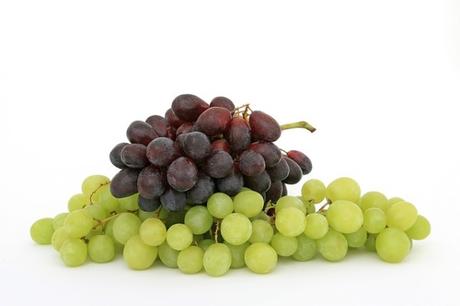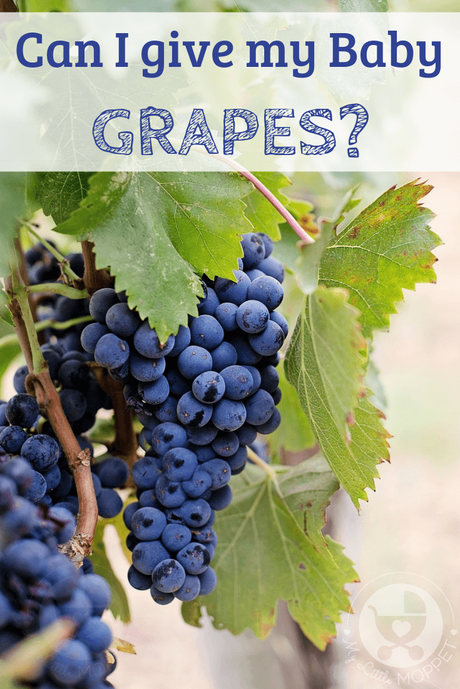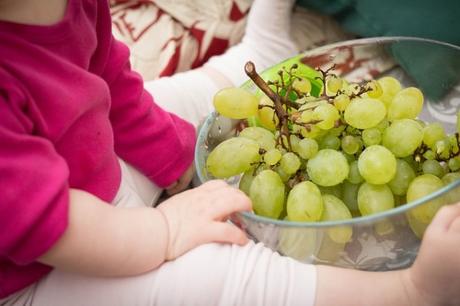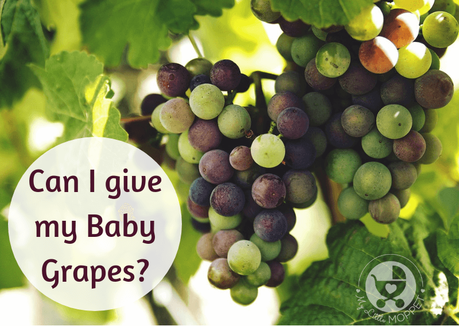March 5, 2019 Leave a Comment
When it comes to grapes, many Moms have this query: Can I give my baby grapes? Read on to find out when and how to feed your baby this yummy fruit.
Buy Homemade Baby & Toddler Food from a Doctor Mom's KitchenOrganic · FSSAI Certified · NABL Lab certified Buy Sprouted Sathumaavu Health Mix powder for Babies / Homemade Cerelac Dry Fruits Powder for Babies/Toddlers Pancake Mixes for Toddlers
If there’s a fruit that features in proverbs and legends across the world, it’s got to be grapes! We’ve all heard of the story of sour grapes while growing up, and there are other sayings in Hindi, like ‘Langoor ke haath mein angoor‘. There are several legends in various cultures around the world around this sweet and sour juicy fruit. In Spain, it is believed that eating twelve grapes at midnight on 31st December will bring good fortune in the New Year. Grapes are often associated with fertility and prosperity – probably because of all those health benefits!
Grapes were first cultivated somewhere around Western Asia, and Spanish explorers are believed to have introduced grapes to America about 300 years ago. Grapes are actually berries, and there are more than 8,000 varieties of grapes around the world. The two main varieties are European and American, with American grapes being available in September and October and European grapes being available throughout the year. The Ruby Roman grapes are one of the most expensive fruits in the world.

The grapes we commonly find in markets are called ‘Table Grapes’, which are different from the grapes used to make wine. Grapes are of different colors – green, red, black, white, yellow, pink, and purple, where the white is actually a light green. Grapes grow as clusters with approximately 75 berries in one cluster. Grapes may be seeded or seedless, although most varieties have tiny seeds in the middle.
Grapes have several uses, and every part of the plant can be used. Besides being eaten raw, grapes are also made into jams, jellies, raisins, vinegar and grape seed oil.Grape seeds are also used in the manufacturing of skin-care products.
Nutritional Benefits of Grapes
Grapes are a low-calorie food with 80% water content, with a cup containing only a 100 calories. A single cup of grapes provides more than a quarter of the daily recommendation of vitamins K and C. Grapes are also rich in antioxidants and low in cholesterol. Here are some more health benefits of grapes:
- Prevents Chronic Diseases like cancer
- Helps to Reduce Cholesterol
- Regulates sleep
- Protects against lifestyle diseases like diabetes and hypertension
- Helps to Maintain Heart Health
- Has healing effects for stress and depression
- Boosts Memory and promotes longevity
- Benefits the bones and nervous system
- Anti-Aging and Promote Longevity
- Relieves Constipation.
- Protects against Respiratory Infections
Can I give my Baby Grapes?

Grapes can be introduced after 6 months of age, but it is highly recommended to wait till at least 8 months. The high fiber and water content can ease constipation in babies. You can choose either sweet purple or green grapes without seeds. Taste them to check whether they are sweet or sour before feeding baby.
Grapes have a high choking risk, due to which it should be given with care. For babies, it is recommended to feed grapes as fruit, rather than juice, which can cause tooth decay. Before feeding, peel, de-seed and mash the flesh into a pulp. Raisins can be soaked in warm water overnight and fed to babies in the morning to help relieve constipation. Grape juices are recommended for children over 1 year, but avoid adding sugar and limit consumption to 4-6 ounces per serving.
Some babies may be allergic to grapes. While not mandatory, it’s better to follow the 3-day rule to be on the safe side, and start with a small quantity in the beginning. If the baby displays symptoms like itchy rashes, abdominal pain, burning sensation in the mouth, swelling of the face or shortness of breath, he needs to be rushed to the doctor right away.
Tips to Buy Grapes for your Baby
- Best option for babies are seedless organic grapes
- Select the bunch with firm and plump grapes that are firmly attached to the stems
- Select grapes with a healthy shade of the skin, as color is a good indicator of quality
- Avoid grapes which are wrinkly, mushy, with blemishes or leaking juices
- It’s better to get fresh grapes and use them within a couple of days
- Storing for too long can make them ripen and get soft as well as sour

Tips to Store and Prepare Grapes for Babies
Both organic as well as normal grapes can have dirt on them, and grapes need to be carefully washed to avoid squishing them. First rinse off the contaminants by placing the grapes under running water. Then create a solution of either 1 tbsp turmeric in a big bowl of water or one part vinegar to three parts water. Soak the grapes in this for 5-10 minutes and wash completely.
You can also spray vinegar solution on the grapes instead of soaking them. Another technique is to sprinkle a few teaspoons of salt and baking soda over the grapes. Shake to mix well and rinse thoroughly. Before storing, remove any damaged grapes. Grapes can be refrigerated for 7-14 days or frozen for 10-12 months.
Grapes Recipes for Babies and Kids

Grape Juice
Raisin Spread
Pumpkin Grape Cheese Puree from Buona Pappa
Beet Grape Puree from Baby Bullet Blog
Raisin Syrup for Babies from GK Food Diary
Frozen Yogurt Grapes from Super Healthy Kids
Dairy Free Grape Smoothie from Little Mashies
Grapes Popsicles from A Small Bite
Grape Juice Jigglers from Sunday Supper Movement
Grape Chutney from Saffron Streaks
Grape Fruit Leather from Real Mom Nutrition
Grape Raitha from Archana’s Kitchen

